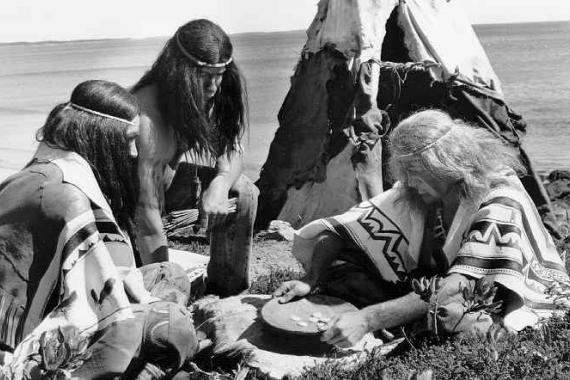The Mi’kmaq resided in, and for a considerable time after the onset of the Europeans, a civilization where respect for the good works of the Great Spirit was its cornerstone. In line with those teachings children were taught from early childhood that they must live honorable lives, share all material goods with their entire community, and make strangers welcome. Greed was discouraged in these teachings. Significant events such as marriages, births, puberty, start of the hunting season, etc., and death were marked and celebrated by ceremonies, stories, songs, chants, and many other traditional practices.
Our history has been transmitted from one generation to the next through oral traditions and mnemonic systems of writing such as pictographs, petroglyphs, wampum and notched sticks, later by hieroglyphs, and more recently by written form in alphabetic writing systems.
Until the last decade or so written Mi’kmaq history has been inked mostly by authors of European descent, and its Eurocentric perspectives have diminished, marginalized, and misinterpreeted our People's history and voice. However, most encouraging, a few non-Mi'kmaw authors are coming forward more respectful of our cultures and representing perspectives that engage a more critical examination of Eurocentric truths, examples are An Unsettled Conquest by Geoffrey Plank and Cornwallis by Jon Tattrie.
Another very encouraging development is that Mi’kmaw authors and historians have also begun to chronicle our history from a Mi’kmaw perspective. For example, the first edition of We Were Not the Savages, by Daniel N. Paul, published in 1993, (updated editions were published in 2000 and 2006) relates the story of the Mi’kmaq from the colonial past to modern times. Also Mi’kmaw life is being presented in a positive manner by Mi’kmaw professionals and researchers in dissertations, journals and reports, as well as in many documentary films.
Featured in this section is a glimpse into the Mi’kmaw way of life - past and present and how it is shaping our current reality.
History Introductiong by Mi'kmaw Elder, (Dr.) Daniel N. Paul, C.M., O.N.S.
Suggested Websites:
Amazon Author's Page
https://www.amazon.com/author/www.danielnpaul.com
Suggested Articles:
The Covenant Chain by Alexander Denny, Donald Marshall sr, Simon Marshall: Drumbeat: Anger and Renewal in Indian Country. Ottawa: Summerhill Press, 1989.
Suggested Books:
Battiste, Jaime. Honoring 400 Years: Kemite’tmnej. Jaime Battiste, 2010. Print.
Paul, Daniel N. We Were Not the Savages: A Mi’kmaq Perspective on the Collision Between European and Native American Civilizations New Twenty-First Century Edition. 3rd ed. Black Point, N.S.: Fernwood Publishing, 2006. Print.







